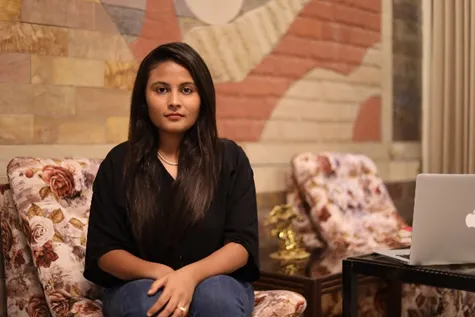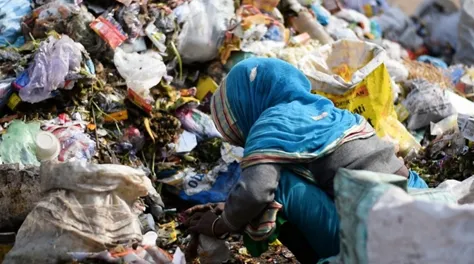How The Disposal Company helps brands meet recycling goals every month
The Disposal Company founded by Bhagyashree Bhansali in 2020, helps brands neutralise their plastic waste by recycling an equal amount from the Ghazipur landfill
An average day for Mukesh involves wearing a safety suit and gloves and getting his hands dirty collecting plastic waste from one of the several heaps at the landfill in Ghazipur, Delhi.
“For the last two years on somedays I collect waste and sell it independently in markets and on other days we are asked by the company to collect a certain amount of plastic waste from the landfill. In exchange we get money from the recyclers and additional incentives from the company,” he tells SocialStory.
As many as 100 such ragpickers are presently working with the Mumbai-based startup— The Disposal Company. The company—founded by Bhagyashree Bhansali in 2020—helps brands neutralise plastic waste by recycling an equal amount from the Ghazipur landfill. According to the data shared by the Centre for Science and Environment and experts, landfills receive almost 3,000 metric tonnes of waste from the national capital every day.
TDC collaborates with rag pickers and waste segregators to retrieve plastic waste from the landfill. For their safety, they are provided with proper safety gear, gloves, and more. It has generated 500 jobs in NCR through this process.
Starting out

Bhagyashree Bhansali
For Bhagyashree Bhansali, who was a passionate environmentalist since she was very young, the concern surrounding the negative impact of plastic on quality of life was personal.
“My mother is a cancer survivor and there is a high probability that I might be carrying the gene. As such whenever I buy a milk packet or carton, I think about the amount of microplastics in it which could prove to be deadly to me. These small instances make me think that it's time we start being more conscious about the environment and work towards creating a cleaner world for our kids," Bhansali tells SocialStory.
Very early on, she dedicated herself to addressing pressing environmental concerns in Delhi like air and water pollution, management of municipal waste, and conserving biodiversity. Her work eventually took her to the Ghazipur landfill, one of the India's largest garbage disposal sites.
“I used to talk to many people during that time to know more about the issues they were facing. A lot of people were struggling with health issues due to environmental pollution, especially in the areas near the Ghazipur landfill. As such we visited the landfill and seeing its condition just shook me to the core. I was frustrated seeing the sheer number of plastic bottles and chip packets there,” she says.
Soon, she began engaging with rag pickers to learn more about the waste collection, segregation, and recycling process.
Loopholes in the waste collection process
Bhansali noticed that the sophisticated machinery used in countries like Germany could not process the type of waste found in the landfill. So, the waste had to be segregated before using the machines.
To find a more localised solution, she began working with local recyclers to make machines that could help segregate waste.
After college, she continued to study the different kinds of plastic, its nature, qualities, and recyclability. She also partnered with organisations like Mohan Meakin, Whirlpool, and Arvind Mills to establish efficient in-house plastic waste management systems. “I worked with the local pollution control board during the lockdown. In Covid there was an addition of used masks and gloves so we had to figure out ways to segregate contaminated waste,” she adds.
It was during this time she saw a sharp rise in direct-to-consumer brands in the market. “Most of these brands make use of low-value plastic for their packaging which is extremely harmful for the environment,” she explains.
After learning about these challenges, Bhansali took the initiative to establish TDC in 2020. Recalling the early days of her venture, she remembers that it took her seven months to secure the company's very first client–mCaffeine and since then there has been no looking back for the company. It now has 65 brands onboard as clients which includes , , , , and .
“I started this company with a purpose to make this place better for the coming generations and that goal keeps me motivated enough to steer through all the challenges and move ahead,” she adds.
TDC recycles an average of 45,000 kgs of plastic every month.
Being part of the solution
TDC neutralises the plastic waste generated by a brand by recovering an equal amount of plastic from landfills which are then recycled. The Central Pollution Control Board (CPCB) maintains a record of the amount of waste that undergoes recycling.
The company works closely with the brand to first educate them on how to improve their packaging and eliminate plastic wherever possible. Following this, the company proceeds to conduct a thorough assessment of all the products associated with the brand. During this assessment, they analyse the types and quantities of plastic used in the manufacturing of each product.
Subsequently, the company obtains detailed information regarding the brand's monthly sales figures. This data is used for the calculation of the total waste generated by the brand over the specified time period.

A rag picker collecting waste
After this, TDC collaborates with rag pickers and waste segregators to retrieve that plastic waste from the Ghazipur landfill. The collected waste is segregated and the plastic is sent to recycling companies like Thermowaste Solutions, Nature Pro.
Once the plastic waste is converted into granules, The Disposal Company sells these granules to various businesses, including the Bangle Industry in Jaipur, Suri Profiles, E3 Clats in the NCR region, and TPR Compounds like KLJ Polymers. These companies use the granules to make products such as furniture, bangles, and photo frames—effectively recycling plastic waste.
Rag pickers are given a minimum of Rs 50 for 1 kg of waste from the recyclers and a variable incentive by TDC.
“My earnings depend on the amount of waste I gather. At times, I've earned as much as Rs 14,000 per month through this work, which serves as a good side income for me,” says Mohit, a 21-year-old graduate who has been with TDC for the last two years.
What’s next for TDC?
TDC has expansion plans in its pipeline, with a target to enter the UK and Singapore markets. It is also looking to collaborate with 1,000 brands within the next two years. Discussing the issue at hand, Bhansali highlights a persistent challenge in the industry. “For a long time, packaging has heavily relied on virgin plastic, making the transition to recycled plastic a challenging feat,” she says.
She also points out that recycling low-value plastic poses profitability challenges for recyclers. Furthermore, the absence of differential GST rates between virgin and recycled plastic offers no financial incentives for recycling efforts. However, she believes that people and brands are becoming more conscious of the environment.
“Either you can be a part of the problem or the solution and I would like to be on the latter end,” she signs off.
(The story was updated to correct a typo.)
Edited by Akanksha Sarma







